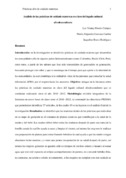Análisis de las prácticas de cuidado maternas en clave del legado cultural afrodescendiente
Resumen
En la investigación se abordó las prácticas de cuidado materno que desarrollan las comunidades afro de algunos países latinoamericanos como: Colombia, Brasil, Chile, Perú, entre otros, a partir de los saberes que han sido transmitidos de generación en generación, buscando proteger este saber y que se mantenga en el tiempo para que aporte a la identidad de las comunidades, la cual contribuye a la calidad de vidas de las personas que consultar la salud diferencial AFRO, por el respeto hacia los ancestros. Objetivo: indagar en la literatura sobre las prácticas de cuidado maternas en clave del legado cultural afrodescendiente que se continúan realizando entre el año 2010 -2012. Metodología: revisión integradora de la literatura en nueve bases de datos entre el 2010 -2022, se contempló las directrices PRISMA que permitieron identificar 37 artículos, de los cuales 19 se incluyeron en el análisis final de la investigación. Resultados: se identificó que las maternas dentro de las prácticas que realizaban en su etapa de gestación es el consumo de plantas curativas que contribuyan a la salud de la madre y del bebé. Las madres deben beber todas las mañanas después de parto una toma de la botella curada la cual los ayuda a sanar y limpiar el vientre, así mismo las mayores le realizan una preparación de plantas para tomar llamado bebedizo la cual ayuda a que las madres tengan abundante leche materna y a tener una pronta recuperación de su salud después de parto, así mismo las mujeres gestantes no pueden salir en tiempos de enclisis solares o lunares ni tomar agua que este esté expuesta al eclipse acompañamiento de partera, no consumir bebidas frías, no serenarse, no asistir a velorio ni cementerio, si las mujeres no cumplen con este cuidado se enfrentan a una enfermedad llamada pasmo que se manifiesta con dolor cabeza picazón en la piel y sangrados abundantes, etc. Conclusiones: existe poca evidencia en la literatura que aborde las prácticas que llevan a cabo las mujeres afrodescendientes en su embarazo, considerándose relevante que futuros estudios estudien la temática desde la metodología de historias de vida en comunidades afro, permitiendo obtener información directa de la población de estudio.
Abstract
The research addressed the maternal care practices developed by Afro communities in some Latin American countries such as: Colombia, Brazil, Chile, Peru, among others, based on the knowledge that has been passed down from generation to generation, seeking to protect this knowledge and maintain it over time so that it contributes to the identity of the communities, which contributes to the quality of life of the people who consult the AFRO differential health, out of respect for their ancestors. Objective: to investigate the literature on maternal care practices in terms of the Afro-descendant cultural legacy that continue to be carried out between 2010 and 2012. Methodology: integrative review of the literature in nine databases between 2010 -2022, taking into account the PRISMA guidelines that allowed us to identify 37 articles, of which 19 were included in the final analysis of the research. Results: it was identified that the practices of mothers during pregnancy included the consumption of curative plants that contribute to the health of the mother and baby. Mothers should drink every morning after childbirth a shot of the cured bottle which helps them to heal and cleanse the womb, as well as the older ones make a preparation of silver to drink called bebedizo which helps mothers to have abundant breast milk and to have a speedy recovery of their health after childbirth, In the same way, pregnant women cannot go out in times of solar or lunar eclipses or drink water that is exposed to the eclipse, accompanied by a midwife, do not consume cold drinks, do not calm down, do not attend wakes or cemeteries, if women do not comply with this care they face a disease called pasmo that manifests itself with itchy headache, itchy skin, abundant bleeding, etc. Conclusions: There is little evidence in the literature that addresses the practices carried out by Afro-descendant women during pregnancy, and it is considered relevant that future studies study the subject using the methodology of life histories in Afro-descendant communities, allowing direct information to be obtained from the study population.
Colecciones
- Trabajo social [101]

